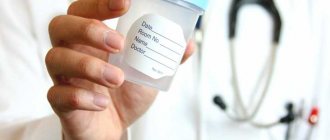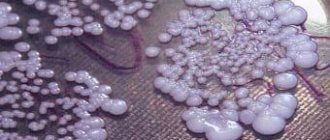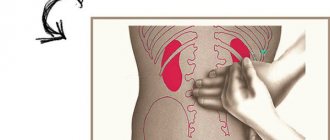Description of the problem
The urine of a healthy person has some odor, but it is not unpleasant or foul-smelling. Therefore, the specific smell of acetone in urine should cause some concern. An unpleasant odor does not mean that there is some kind of pathology in the body; it is likely that it is caused by taking medications or unhealthy eating habits. But it is still recommended to pay attention to changes in health status and determine the reasons.
The smell of acetone in urine is an alarming sign that requires attention. Acetone is an intermediate substance in the process of breakdown of fat and protein structures; it is always found in moderate quantities in the human body. Formed in the form of ketone bodies, it can appear not only in urine, but also in human saliva. This certainly indicates pathological processes in the body and requires prompt medical intervention. After all, in a healthy person, ketone bodies are eliminated from the body through breathing or through the urinary system.
How does ketonuria manifest?
Ketonuria / acetonuria is a pathological condition of the human body, characterized by the appearance of ketone bodies, accompanied by the smell of acetone in the urine. Every day, human kidneys pass through up to 1,500 liters of blood. Liquid passes through the blood vessels of the urinary system about 300 times, while being cleansed of unnecessary waste products.
The capillaries of the renal corpuscles work as a special filter; they retain large particles and allow amino acids, salts, and water to pass through. This is how the first urine is formed.
After this, the blood passes through the tubular system of the kidneys, where some of the filtered compounds enter it and the process of reabsorption of substances takes place. And the remaining substances that are unnecessary for a person exit through the ureters into the bladder and are excreted through the urethra. This is secondary urine.
A strong odor of acetone in urine most likely indicates pathology. It is typical for adults, children, women and men. Pregnant women and children are most susceptible to it.
Causes of the smell of acetone in urine in women
The smell of acetone in urine in the morning most likely signals symptoms of renal stagnation, insufficient fluid intake during pregnancy, and a sedentary lifestyle. If the smell is caused by these reasons, then it is not dangerous and does not require special treatment. The only thing you need to do is drink more fluids and lead a more active lifestyle.
Other, more serious reasons for the appearance of the smell of acetone in the urine may be signs of the development of diabetes mellitus; if there are other symptoms of this disease, you should take a blood test and completely examine the body; infection in the genitourinary system; damage to the kidneys, bladder, etc. In these cases, the urine smells throughout the day, and not just in the morning.
It is necessary to pay attention to the appearance of urine, its condition and color. Pain during urination should be of particular concern.
Basically, the causes of the smell of acetone in urine are divided into external and internal.
External factors include:
- stress - as a consequence of chronic lack of sleep, surgical interventions;
- poor nutrition - eating large amounts of fatty meat or fish, lack of carbohydrates, periods of fasting;
- intoxication of the body with alcoholic beverages - especially if vomiting or diarrhea is added, that is, the process of dehydration of the body is underway;
- heavy metal poisoning;
- head injuries, such as concussions.
Internal factors include:
- malignant tumors of the digestive system;
- weak functioning of the pancreas, which causes a lack of enzymes that affect the quality of food processing;
- diabetes;
- tumors, injuries of the central nervous system;
- increased work of the endocrine gland in the body, which causes acceleration of metabolism and an imbalance in the penetration and processing of digested food;
- toxicosis in any trimester in pregnant women.
The smell of acetone occurs as a result of infectious diseases. Especially if there is an increase in body temperature. This clearly indicates negative changes and the need for immediate treatment.
Acetone in the urine is a consequence; you need to look for the root cause of its appearance!
If the unpleasant odor goes away after 2-4 days, then there is no need to worry. Everything is back to normal. For example, if this was caused by severe physical fatigue or great stress, then after rest the body recovers and the level of acetone decreases. Also, if the increase was caused by fasting, strict diets, or lack of carbohydrates, then after adjusting the diet everything will also return to its place. When it comes to alcohol or food poisoning, then with the elimination of this problem by cleansing the body, after the normalization of the gastrointestinal tract, the problem with acetone goes away.
Acetonuria caused by inflammatory processes in the body should be taken much more seriously. In long-term cases, only a doctor can diagnose the cause through laboratory and clinical tests and examinations. Therefore, if the reason for the increase in acetone is not obvious, you should immediately consult a doctor.
Exhale: causes of bad breath
Halitosis is the scientific name for bad breath. It can appear sporadically - after an overly spicy lunch, or it can constantly haunt you, no matter how hard you try to get rid of it. Halitosis occurs when the concentration of volatile sulfur compounds, such as hydrogen sulfide, is exceeded in the air that a person exhales. These substances are a waste product of anaerobic bacteria living in the oral cavity. As long as everything is in order and the number of bacteria is normal, there is practically no smell. But as soon as microorganisms begin to multiply uncontrollably on the mucous membrane of the mouth, pharynx, tongue, tonsils and interdental spaces, the smell becomes strong and unpleasant.
As a rule, the patient is informed about the presence of a problem by people from his close circle. The presence of halitosis causes moral suffering to a person, limits his communication with others, and contributes to the appearance of complexes.
It is important to understand that bad breath is not actually a disease as such. It is a kind of indicator of the presence of pathological changes in the human body that require medical intervention to maintain health.
Causes of halistosis
Let's figure out what causes bad breath? If you do not take into account the aromatic characteristics of some foods (onions, garlic) and bad habits (smoking and alcohol), oral diseases comfortably occupy first place in the ranking of causes of halitosis. These are holes in the teeth, pulpitis and periodontitis, gingivitis, stomatitis, tartar, dental cysts, as well as irregular and poor oral hygiene. For example, it is possible to identify such a serious dental disease as gangrenous pulpitis by the specific smell from the mouth.
In second place are diseases of the mucous membrane of the nasopharynx and ENT organs, in which there is inflammation with purulent discharge. Sinusitis, tonsillitis, pharyngitis, tonsillitis, sinusitis, diseases of the lungs and trachea, as well as all diseases in which the nose is blocked, contribute to the development of halitosis.
Forced breathing through the mouth also leads to dry mouth and comes in third on our list.
Dry mouth
Xerostomia , or dry mouth. Why do we all suffer from bad breath in the morning? The reason is simple - due to the fact that during sleep the body produces less saliva than during the day, and our mouth dries out. The same thing happens when we talk for a long time. In some people, dry mouth becomes chronic - this is xerostomia. Saliva is one of our natural cleansers; with every sip, it rids us of millions of bacteria and also flushes out the food particles that these bacteria feed on. Consequently, the less saliva is produced, the worse the oral cavity is cleaned, and the more sources of unpleasant odor are formed there. Xerostomia can also be a side effect of certain medications or occur as we age when our salivary glands stop working as efficiently as they used to.
Some diseases of the internal organs can also cause halitosis. These are gastroesophageal reflux disease, gastritis, peptic ulcer of the stomach and duodenum, cholecystitis, pancreatitis, enteritis, colitis, parasitosis, liver disease. With these diseases, disturbances in the normal composition of the microflora of the gastrointestinal tract occur and pathogenic microorganisms “rise” up the intestinal tube. A coating appears on the tongue.
A visit to a therapist will also be necessary to rule out kidney disease - the cause of the smell may be chronic pyelonephritis, glomerulonephritis, or renal failure.
The characteristic smell of acetone is a sign of diabetes and indicates that you should immediately consult an endocrinologist.
Thus, five main causes of bad breath have been identified. Given the above, patients with symptoms of halitosis should first be examined by a dentist. It is necessary to exclude plaque or tartar, caries, periodontitis, gingivitis, and, if necessary, undergo appropriate treatment. In the absence of dental pathology, a patient with halitosis needs consultation with a therapist, gastroenterologist, otolaryngologist and endocrinologist.
Prevention
1. Oral hygiene:
- Brushing your teeth at least 2 times a day (morning and evening 30 minutes after meals). If you can’t brush your teeth, you can use chewing gum. You need to brush not only your teeth and gums, but also your tongue and the inside of your cheeks.
- Avoid drying out your mouth, which disrupts the natural bacterial balance. Stimulate saliva production; it cleanses the mouth by dissolving and washing away bacteria. To do this, chew something from time to time, for example, clove seeds, parsley, dill or mint. Mints and chewing gum also promote salivation, but make sure they don't contain sugar, as this promotes the growth of bacteria that cause tooth decay.
2. Drink more water. If it is deficient, the body will try to retain it, which reduces the formation of saliva.
3. Rinse your mouth with infusions. Infusions of fresh dill, oxalis leaves, strawberries, mint, wormwood, St. John's wort, chamomile and oak bark help well. Yes, and plain water will help if nothing else is at hand.
4. Adjust your diet. Remember that excess carbohydrates and protein foods increase the amount of plaque on teeth. Eat more fresh greens, vegetables and fruits, which naturally cleanse the mouth and normalize intestinal function.
Determination of the amount of acetone in the body
There are two main ways to diagnose the amount of acetone in urine:
- Get tested in the laboratory
. If you suspect an increased amount of acetone in the urine, the doctor will prescribe a referral for a general urine test. This analysis is taken in the morning, in a clean and dry container, in compliance with standard morning hygiene. - Do the test at home
. Due to the spread of the problem of acetone in urine, tests for determining the amount of acetone in urine began to be freely available in pharmacies.
It is recommended to purchase not one, but several tests at once. Conduct testing in the morning for three days in a row. The test strip is lowered into a container with collected urine, a waiting time is maintained and the result is assessed. The number of ketone bodies is determined by the color of the band. Pink color means the presence of acetone in the urine. Purple color means excess acetone. Of course, the result of home testing will not be accurate, but it will establish the very fact of the presence or absence of a pathological amount of acetone.
Important to remember! The normal level of acetone in urine is 0.01-0.03 g per day.
If there are no ketone bodies in the urine, this is normal. If there is an insignificant, minimal amount, there will be a plus on the analysis form. One plus means that the reaction is weakly positive. Two or three pluses are positive, and four or more are critical.
Of course, the outpatient option is preferable, since not only the presence of ketones is analyzed, but also their ratio. Ultrasound of the abdominal organs, CT, MRI, and tests for tumor markers may also be prescribed.
Acetone in urine - symptoms
The smell of acetone in the urine is not the only symptom of acetonuria. Along with it, the following symptoms appear:
- ammonia odor from the mouth;
- lack of appetite;
- lethargy;
- nausea;
- vomit.
If all of the above symptoms are present at the same time, do not hesitate for a second; urgent medical intervention is needed. These symptoms signal problems with possible further serious consequences, such as dehydration, damage to the functioning of the central nervous system, and in severe cases even coma.
But, if the only symptoms are an unpleasant smell of urine, then most likely the problems are not that large-scale. It is necessary to check the acidity level of urine and determine the depth of the problem.
Disease prevention
Therefore, going to the doctor for a diagnosis and prescription of optimal treatment is vital. During the initial examination, the doctor looks at the patient’s face (swelling, pallor, jaundice), and “smells” the urinary odor from the mouth. He wonders if there are cramps in the legs, if the bones hurt, if sleep and appetite are disturbed. And then everything goes according to the symptoms described above.
The following studies are being carried out: 1. Blood tests (for creatinine level) and urine (for protein content), extended, biochemical.2. Analysis of the filtration rate of GFR (the main indicator of kidney function) by radioisotope methods, using serum cystatin C, “manually” (the doctor calculates the creatinine level using a blood test, age, nationality, gender, etc.
), other methods.3. Blood pressure measurement.4. Microalbuminuria (urinalysis, very accurate).5. Submitting the daily volume of urine to determine the ratio of protein and creatinine.6. Ultrasound or CT (computed tomography) for pathologies of the kidneys and urinary tract, their size changes, the presence of stones or tumors, etc.8. A kidney biopsy to determine how severely the kidney is affected.
Since renal failure (acute and chronic) is a life-threatening disease, its prevention should be given increased attention: - follow a diet; - maintain a gentle work regimen without excessive physical exertion; - regularly see a doctor; - treat causative diseases (diabetes mellitus, hypertension, scleroderma and others);
The smell of acetone in urine during pregnancy
The most common odor in urine during pregnancy occurs:
- With prolonged toxicosis, accompanied by repeated and prolonged vomiting. Mild nausea and rare vomiting in the early stages of pregnancy are normal and do not give cause for deep concern. But constant vomiting, which prevents a woman from eating, and in some cases, even drinking water, is a clear danger to both the woman and the fetus, and requires immediate medical intervention.
- If acetone is detected in the urine in the last stages of pregnancy, urgent examination, treatment and, most likely, hospitalization are necessary.
For what reasons can acetone appear in the urine in pregnant women:
- malnutrition;
- liver diseases;
- diabetes;
- anemia;
- eating junk food;
- insufficient drinking regime.
One of the most dangerous causes is diabetes.
Acetone in the urine of a diabetic patient is often a harbinger of diabetic coma.
During pregnancy, it can manifest itself as a progression of a previously diagnosed disease - due to the weakening of the body during pregnancy and the inability to cope with additional load, and as a gestational form of diabetes, or as it is otherwise called, gestational diabetes. After the baby is born, blood glucose levels return to normal.
Types of disease
Kidney failure is divided into acute and chronic. Acute renal failure is mainly a consequence of acute kidney diseases: nephritis, pyelonephritis, hydronephrosis, urolithiasis and others. The disease begins suddenly and proceeds violently, and if it is treated immediately, the kidneys safely and quickly restore their functions. If treatment is ignored, the disease will progress to the chronic stage of renal failure.
Acute renal failure is a consequence of nephritis, pyelonephritis, hydronephrosis, urolithiasis and others
Acute kidney failure goes through four stages.
- The first stage is characterized by a decrease in the volume of urine excreted, blood pressure, and increased heart rate and pulse. There may be a painful shock.
- In the second stage, there is a noticeable decrease in urine output until urination stops completely.
- Loss of appetite, nausea and vomiting, and frequent muscle cramps. The patient is weak and drowsy, lethargic and breathing heavily. The condition is very serious, the body and its work are completely unbalanced. There is a threat to life.
The third stage is characterized by an increase in the volume of urine excreted to normal, but “waste” of vital activity is not excreted along with the urine. The threat to life remains. In the last, fourth stage, the process of urination is normalized, and kidney function is gradually restored.
Chronic renal failure develops gradually, often secretly and also gradually and secretly progresses, and the consequences of not taking any measures to return the kidneys to their normal functioning can be very sad. Often, in order to save the patient’s life, they resort to blood purification using hemodialysis or peritoneal dialysis, or even have to undergo a kidney transplant operation.
1. Latent (hidden). The patient quickly gets tired, feels weak and dry in the mouth. Having donated blood for analysis, you can detect disturbances in the electrolyte composition of the blood, and protein can be detected in the urine.
2. Compensated (evening out painful disorders). The patient gets very tired and very tired, often feels weak, has frequent bouts of thirst and more frequent urination with an increase in the volume of urine produced. When taking blood and urine tests, strong changes in the body are detected (presence of significant amounts of nitrogen, urea, creatinine in the blood, protein and salts in the urine).
3. Intermittent (exacerbation is replaced by relief). The symptoms are already very pronounced: - constant weakness; - fatigue; - lethargy; - constant thirst; - constant dry mouth; - complete lack of appetite; - bloating; - vomiting; - nausea; - yellowness and dryness of the skin; - development chronic tonsillitis, pharyngitis and other colds that are difficult to treat; - weakness of the kidneys (poor blood filtration); - poor blood and urine tests.
4. Terminal (final). The kidneys practically do not work, therefore: - in the blood and urine the content of urea, creatinine, uric acid is greatly increased; - intoxication of the body (urine in the blood); - almost no urge to urinate; - complete imbalance of the body: cardiovascular system (cardiac dystrophy muscles), circulatory (poor circulation and blood clotting), pulmonary edema; - poor sleep and appetite; - weak immunity and memory; - constant depression.
Kidney failure in children indicates complete impairment of kidney function.
- uremia (urine in the blood), as a result - intoxication (poisoning) of the body; - aversion to meat food; - frequent attacks of nausea and vomiting; - constant thirst; - muscle cramps; - hallucinations; - pain in bones and joints; - painful yellow complexion; - smell of ammonia from the mouth; - swelling; - rapid breathing, palpitations and arrhythmia;
- decreased amount of urine excreted; - increased blood pressure; - enlarged liver (heaviness in the right hypochondrium); - pain in the heart; - nose and stomach bleeding, hemorrhages on the skin due to blood clotting disorders; - attacks of heart and pulmonary failure; - skin itching ;— clouded consciousness.
Kidney failure in children. Let us immediately note that renal failure manifests itself and proceeds in the same way in both adults and children. Symptoms of the disease in children, as well as in adults, almost do not appear in the early stages. By the time the symptoms are no longer hidden, it is often too late.
Kidney failure in children indicates only one thing - a complete impairment of kidney function. Children complain of general malaise and headache. They are pale and weak, and lag behind their peers in terms of growth and development. Children constantly want to drink and urinate. If children are not treated, then over time they become inhibited and lethargic, and speak slowly. Children lose weight and often feel sick and vomit.
Prevention of kidney failure in children: - timely diagnosis of congenital kidney diseases; - avoidance of stress; - refusal of vaccinations; - timely treatment of infectious diseases.
A special menu normalizes kidney function, lowers blood pressure, relieves swelling, and removes nitrogen compounds
For any type and stage of renal failure, a special diet with dosed intake of protein and potassium is required, which reduces the load on the kidneys, slows down the development of the disease and significantly improves the general condition of the patient. A special menu normalizes kidney function, lowers blood pressure, relieves swelling, and removes nitrogen compounds.
The general principles of the diet are as follows:—reducing protein foods to a minimum;—consuming high-calorie foods (fatty and sweet);—limited but sufficient consumption of fruits and vegetables;—less salt and liquid (until kidney function is restored);—in the future, with recovery , it is recommended to drink plenty of fluids (compotes and juices), as well as the gradual inclusion of proteins and table salt in food;
- exclusion from the diet of confectionery and flour products, cheeses, animal fats, legumes, pickled and pickled products, spinach and sorrel, radishes and radishes, mushrooms and milk soups, as well as meat and fish broths; - limiting the consumption of chocolate and cocoa-containing products, coffee and mineral waters.
The menu (five to six meals a day) for a patient with renal failure may include: - bread without salt; - pancakes and pancakes without salt; - milk or kefir (yogurt) - a glass; - one egg; - cottage cheese with sour cream (bowl); - a small piece (50 grams) of boiled meat or fish; - butter (butter, vegetable); - porridge from all kinds of cereals that remove toxins;
How to remove acetone from the body?
To remove acetone you must first:
- Control blood sugar levels. It is best to measure your sugar level every three hours and inject insulin at 1-3 units at the same interval. This is important because when acetone is present in the body, blood sugar levels rise even without eating.
- Maintain a drinking regime - drink as much as possible.
- Eliminate fatty and high-carbohydrate foods from your diet.
The diet should be adjusted as follows:
| Not recommended | Recommended |
| Lard, fatty meat | Vegetables, greens, fruits |
| By-products | A small amount of honey and homemade jam |
| Fat broths | Porridge |
| Pickled products | Vegetable broth |
| Fat sour cream | Biscuits, crackers |
| Chocolate, coffee, cocoa | Weak tea, jelly, compote |
| Citrus |
In addition, mineral water with lemon (1 lemon per 1.5 liters of mineral water), a tablespoon of honey (if blood sugar is normal), water with soda (1 tablespoon of soda per 1 liter of water) can help in removing acetone.
Drug treatment consists of equalizing the acid-base balance in the body:
- Oral rehydration with Regidron and Oralit solutions. If the body is severely dehydrated, droppers of Rheosorbilact, 5-10% glucose solution with insulin, and Ringer's solution are prescribed. Xylate is also used, which slows down the formation of acetone and increases its absorption by the liver.
- To stop vomiting, Osetron is prescribed; it can be injected every 5-6 hours.
- Glutargin, Ursofalk, Betargin are used to support the liver.
- For rapid absorption of acetone from the intestine, absorbents such as activated carbon, Enterosgel, Atoxyl are prescribed.
After the patient’s condition is normalized, treatment of the cause of the increased level of acetone in the urine begins. Treatment depends on the pathogenesis of the disease. Competent and timely treatment stops ketogenesis and helps remove remaining acetone from the body.
Kidney failure and its symptoms
If the acid-base and water-electrolyte balance in the body is disturbed, it means that there is a violation of kidney function, which is called renal failure. With this syndrome, a disorder of homeostasis occurs, an imbalance of the most important internal processes in the human body, which leads to such disturbances in the internal environment of the body as body temperature, blood pressure, and blood sugar concentration.
Since the kidneys cannot cope with the function of removing the “waste” of the human body, harmful substances accumulate in it, and gradual poisoning of the body begins to occur - intoxication, which, in turn, leads to various serious, and not very serious, disorders in human health.
Very often, when the disease just begins, its symptoms hardly appear, but some signs of kidney failure can be noticed:
- unexplained weakness;
- fast fatiguability;
- insomnia or constant desire to sleep;
- lack of healthy appetite;
- absent-mindedness;
- poor concentration;
- the first swelling of the eyelids in the morning and ankle joints in the evening;
- changes in the skin (dryness, peeling, irritation);
- running to the toilet to urinate, especially at night;
- stool disorders;
- muscle spasms;
- unpleasant itchy sensations on the skin;
- later a bitter taste appears in the mouth, painful sensations in the stomach, and a complete reluctance to eat.
If you have such disturbing signs, you should consult a doctor so as not to start the onset of the disease.
Measures to prevent the appearance of acetone odor
At the end of the article, a few words about what to do to prevent and protect the body from the appearance of acetone in the urine. The most important thing is to maintain an active and healthy lifestyle.
These include moderate physical activity, swimming and contrast showers as ways to harden the body, adequate sleep for at least 7-8 hours a day, walks in the fresh air to improve immunity and prevent anemia, proper drinking regimen, and avoid stressful situations. If acetone reappears in the urine, it is recommended to undergo diagnostics of the whole body at least 2 times a year.








